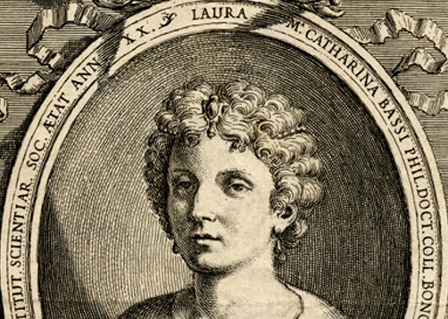
WTI Magazine #83 2016 September 16
Author : Giovanni Verde Translation by:
Scholar of physics, biology, mathematics, logic, philosophy, Latin, Greek and French, Laura Bassi Veratti was the first woman in the world to achieve an academic career and the first to be appointed chair at a University, becoming one of the most important European symbols of women's emancipation. Laura Bassi Veratti was born in Bologna on October 29, 1711 by Joseph and Maria Rosaria Cesari. She shows from the very first years of life a great desire to learn and a precocious maturity: she loves to study, especially philosophy and logic, privately under the guidance of the family doctor, Gaetano Tacconi, medicine lecturer at the University and member of the Academy of Sciences.
Laura achieves excellent results, so much that Tacconi thinks that, even if she's yet a 20 years old girl, "able to give a welcomed and pleasant surprise to the public".
On April 17, 1732 Laura Bassi discusses her thesis "De universa re philosophica" (The whole philosophy) in presence of Cardinal Prospero Lambertini, the future Pope Benedict XIV, and numerous knights, religious, literary figures. The young Laura answers questions asked by five different scholars, leaving them so admired and impressed that on May 12 of the same year she receives the degree in philosophy and is awarded in a solemn ceremony held in the prestigious Hercules hall of the public palace. This is an extraordinary event for the time: for several days, the city publicly celebrates and honor the newly doctor.
The Academic Senate lets her know its favorable disposition to endow her a tenure, and this is enough to convince her to discuss on June 1 her thesis "De aqua corpore naturali, elementi aliorum corporum, parte Universi", obtaining ex officio the readership of "Philosophia universa" that she would keep for her whole life.
Laura Bassi is a follower of Newton's theories, and she tries to apply them in various fields of research, particularly in the electrical physics, of which she becomes, together with her husband Giuseppe Veratti, a leading Italian scholar. The university chair to teach physics, then called natural philosophy, is the culmination of a unique path of studies, the ultimate success of a woman in an era in which women were precluded of any intellectual academic and professional career.
The Senate stresses that its resolution is not a real teaching mandate, but a recognition of the efforts of the young Doctor who, being a woman, is allowed to hold lessons in the Archiginnasio, the ancient seat of the University, only if justified by superiors. Laura does not accepts this interpretation and launches a series of courses in Experimental Physics held in her home, even setting up a laboratory for experiments and demonstrations.
In 1745, Laura Bassi is the first woman ever to join the Benedictine Academy: she is the one who persuades Pope Benedict XIV to create a twentyfifth extra for her, while the Academy normally has 24 members. With this appointment, although again she does not have the same rights enjoyed by the other academics, she conquers the highest recognition for her scientific activities.
In 1776, thanks to the esteem she has deserved through her research and teaching, Laura Bassi manages to get herself assigned as Professor and Chair of Experimental Physics at the Institute of Science, finally without any limitation due to her gender. She perfectly speaks French, used by her to discuss with her visitors and in experimental demonstrations for the benefit of foreigners.
Laura Bassi is considered at that time an extraordinary woman with a phenomenal talent in several topics such as Latin, logic, metaphysics, natural philosophy, algebra, geometry, Greek. She dies in Bologna on February 20, 1778, leaving a powerful testimony of redemption of the intellectual abilities of women and of their public recognition.



